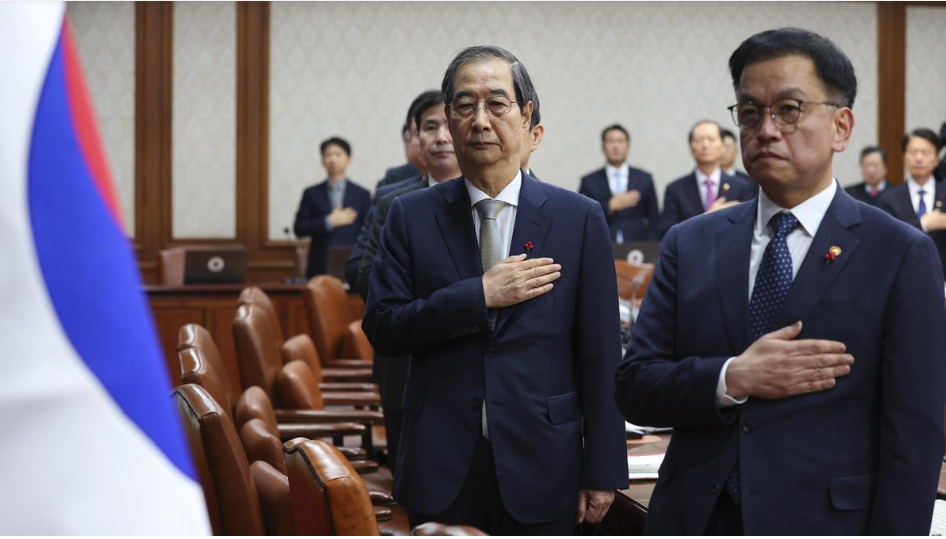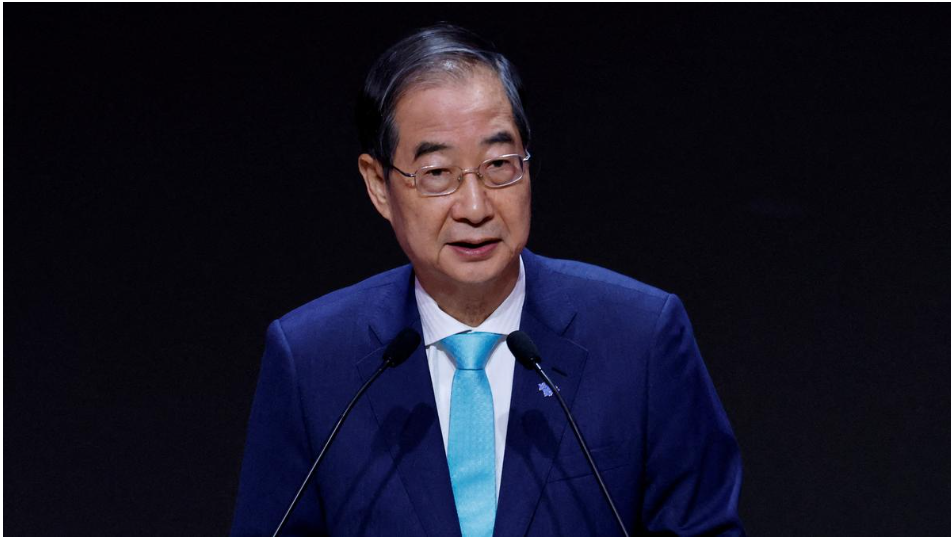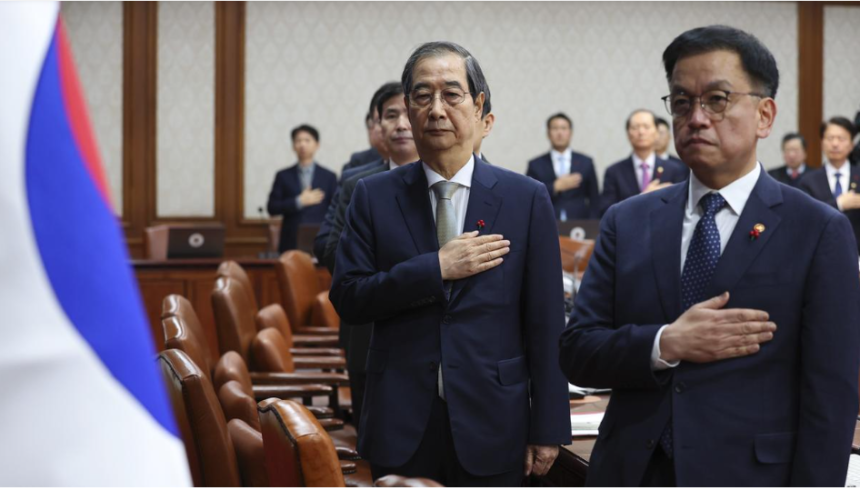Introduction
South Korea’s is bracing for escalating political chaos as the opposition party vows to impeach Acting President Han Duck-soo. This move follows the shocking declaration of martial law by President Yoon Suk-yeol and his subsequent impeachment by the National Assembly, a series of events that have plunged the nation into political uncertainty and drawn international concern.
The opposition’s push to remove Han, who assumed acting presidential duties after Yoon’s impeachment, threatens to further destabilize the nation’s already volatile political landscape. Neighboring countries, including China, Japan, and the United States, are watching closely, apprehensive about the broader implications of this unrest in a geopolitically critical region.
Backdrop of the Crisis
South Korea’s political turmoil began when President Yoon Suk-yeol declared martial law amid escalating tensions over domestic protests and alleged security threats. The move, criticized as an authoritarian overreach, led to mass demonstrations and accusations of constitutional violations.
Facing fierce backlash, the National Assembly, dominated by the opposition Democratic Party of Korea (DPK), swiftly initiated impeachment proceedings. Yoon’s impeachment was ratified in a historic parliamentary vote, leading to Prime Minister Han Duck-soo stepping in as acting president.  For the more information click on this link
For the more information click on this link
Opposition’s Case for Han Duck-soo’s Impeachment
The DPK argues that Han Duck-soo, as a close ally of Yoon, is complicit in his administration’s controversial policies, including the martial law declaration. Opposition leaders accuse Han of failing to exert an independent, stabilizing influence during his acting presidency and instead perpetuating what they term “an authoritarian drift.”
Key Allegations:
- Support for Martial Law: Critics say Han backed Yoon’s controversial decision, undermining democratic norms.
- Failure to Address Civil Unrest: The acting president has been accused of mishandling nationwide protests and exacerbating public distrust.
- Economic Mismanagement: Han is also under fire for insufficiently addressing South Korea’s economic challenges amid growing inflation and unemployment.
Opposition leader Lee Jae-myung declared, “The acting president is part of the problem, not the solution. His removal is necessary to restore trust and accountability.”
What Does Impeachment Entail?
Under South Korea’s Constitution, the impeachment of a president or acting president is an extraordinary measure requiring substantial political consensus and judicial review.
- National Assembly Proceedings: The motion requires a simple majority in the National Assembly to initiate, a threshold the DPK can easily meet with its parliamentary dominance.
- Judicial Review: The Constitutional Court would need to determine the validity of the impeachment within 180 days. This involves evaluating whether Han’s actions violated constitutional or legal norms.
Should Han be impeached and removed, the government could face a complete leadership vacuum, forcing snap elections or the appointment of an interim leader.
Domestic Implications
- Increased Political Polarization:
South Korea’s already divided political climate risks spiraling into deeper discord. Protests by both government supporters and opposition factions have intensified in the wake of Yoon’s impeachment, and Han’s removal could further inflame tensions. - Impact on Governance:
Critical policy initiatives, including economic recovery plans and security measures, are likely to face delays as government institutions focus on political infighting. - Public Discontent:
South Koreans, weary of political scandals and instability, have expressed frustration with both the ruling and opposition parties. The prolonged crisis could lead to voter disillusionment ahead of upcoming elections.
Regional Concerns and International Reactions
South Korea’s turmoil has sparked apprehension in neighboring countries and among global powers.
- Japan: As a close economic partner, Japan fears instability in South Korea could disrupt bilateral trade and cooperation on North Korea-related security issues.
- China: The region’s largest power, China is watching closely, wary of a leadership vacuum weakening South Korea’s diplomatic stance amid ongoing regional tensions.
- United States: South Korea’s key ally, the U.S., has expressed concerns about the implications of the political unrest on their joint defense posture and the broader Indo-Pacific strategy.
Potential Outcomes
While Han’s impeachment proceedings appear likely to move forward, their eventual outcome depends on several factors.
- Constitutional Court Decision: Even if the National Assembly approves the impeachment motion, the Constitutional Court may not find sufficient grounds to remove Han.
- Public Sentiment: Massive public protests against further destabilization could pressure the opposition to reconsider its strategy.
- Resolution Through Negotiations: An unlikely but possible outcome could involve political negotiations leading to Han’s resignation or a power-sharing arrangement to restore stability.
Broader Implications for South Korean Democracy
The current crisis marks one of the most significant stress tests for South Korea’s democratic institutions since the impeachment of former President Park Geun-hye in 2017. While the ability to hold leaders accountable demonstrates the strength of the country’s democratic framework, the polarization and unrest highlight vulnerabilities in its political culture.  For the more information click on this link
For the more information click on this link
Lessons from the Crisis:
- Need for Institutional Reforms: The repeated use of impeachment reflects underlying systemic issues requiring long-term solutions.
- Importance of Political Accountability: Both ruling and opposition parties must prioritize accountability and transparency to rebuild public trust.
- Maintaining Democratic Norms: As one of Asia’s leading democracies, South Korea’s ability to navigate the current crisis peacefully will have far-reaching implications for its global image.
Conclusion
The opposition’s move to impeach Acting President Han Duck-soo marks a critical turning point in South Korea’s unfolding political drama. While intended as a step toward accountability, the impeachment push risks deepening divisions and exacerbating domestic and regional uncertainty.
As the nation grapples with its most significant political crisis in years, the actions of its leaders, institutions, and citizens will shape South Korea’s democratic trajectory and its role in the broader global order. The world watches as this pivotal chapter in the country’s history unfolds. ALSO READ:-Tragic Factory Explosion in Turkey: 12 Dead in Balikesir Blast 2024





